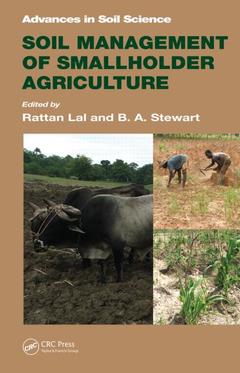Description
Soil Management of Smallholder Agriculture
Advances in Soil Science Series
Language: English
Subjects for Soil Management of Smallholder Agriculture:
Keywords
South ASIA; Soil Fertility; Soil-related constraints to smallholder agriculture; Soil Quality; Nutrient management in soils of the tropics; Soil Management; Improving soil quality; Continuous Maize Cropping; Competing uses of crop residues; Soil Science; Enhancing resource-use efficiency; Soil Organic Carbon; SOC Sequestration; Soil Organic Matter; Sustainable Intensification; NT Farming; Soil Security; Precision Agriculture; Agronomic Productivity; SOC Concentration; Improved Fallows; Diffusion Model; East ASIA; Sustainable Agricultural Intensification; Tamil Nadu; Fertilizer Managements; Long Term Field Experiments; Traditional Diffusion Model; Reduced Tillage; SOC Sequestration Potential
· 15.6x23.4 cm · Hardback
Description
/li>Contents
/li>Readership
/li>Biography
/li>
Nearly two billion people depend on hundreds of millions of smallholder farmers for food security. Yet, these farmers? lives also hang in the balance due to their extreme vulnerability to the risks of soil degradation and depletion, soil exhaustion, climate change, and numerous biotic and abiotic stresses. Soil Management of Smallholder Agriculture explores the potential smallholder agriculture hold for advancing global food security and outlines the challenges to achieving this goal.
The book addresses the challenges and opportunities that resource-poor and small landholders face and provides recommended management practices to alleviate soil-related constraints, and increase and sustain crop yield and production. It discusses the cultural, economic, social, and technological aspects of sustainable soil management for smallholder farmers. It then examines soil-related and institutional constraints, principles of sustainable agriculture, soil quality improvement, nutrient and soil fertility management, soil carbon sequestration, soil security, efficient use of resources, and agronomic production.
Edited by experts, the book makes the case for the adoption of proven technologies of sustainable intensification, producing more from less, both for advancing agronomic production and adapting to changing climate. It outlines a strategy that will usher in a soil-based Green Revolution by increasing the use efficiency of energy-based inputs such as fertilizers, pesticides, and irrigation to restore soil quality, and sequestering carbon in the terrestrial ecosystems. This strategy helps small farms narrow the gap between the actual and attainable crop yield.
Soil-related constraints to smallholder agriculture. Smallholder agriculture in Sub-Saharan Africa. Subsistence farming in India. Resource-poor farmers of Central America and the Caribbeans. Technological options for alleviating soil-related constraints of resource-poor farmers. Nutrient management in soils of the tropics. Improving soil quality. Principles of sustainable agriculture. Managing soil fertility in dry region. Soil C sequestration and the human dimensions. Organic vs. inorganic soil nutrients. Sustainable soil management as an engine of economic development. Competing uses of crop residues. Soil security for resource-poor farmers. Soil biology and ecology. The human dimensions. Economics of crop production. Enhancing resource-use efficiency. Institutional constraints. Towards improving agronomic production. Research and development priorities.
Rattan Lal, Ph.D., is a Distinguished University Professor of Soil Science and Director of the Carbon Management and Sequestration Center, The Ohio State University, and an Adjucnct Professor of University of Iceland. With completion of education from Punjab Agricultural University, Ludhiana (B.Sc, 1963), Indian Agricultural Research Institute, New Delhi (M.Sc, 1965),and the Ohio State University ,Columbus( Ph.D,1968), he served as Sr. Research Fellow with the University of Sydney, Australia (1968-69), Soil Physicist at IITA, Ibadan, Nigeria (1969-87), and Professor of Soil Science at OSU (1987-to date).His current research focus is on climate-resilient agriculture, soil carbon sequestration, sustainable intensification , enhancing use efficiency of agroecosystems ,and sustainable management of soil resources of the tropics. He is a fellow of the American Society of Agronomy (ASA), Soil Science Society of America (SSSA), Third World Academy of Sciences, American Association for the Advancement of Sciences, Soil and Water Conservation Society (SWCS), Indian Academy of Agricultural Sciences, and Rothamsted (U.K.). He received the Hugh Hammond Bennett Award of the SWCS, 2005 Borlaug Award, and Liebig Award (2006) of the International Union of Soil Science, M.S. Swaminathan Award (India) of 2009, and COMLAND Award (Germany) of 2009. He received honorary degree of Doctor of Science from Punjab Agricultural University (2001), the Norwegian University of Life Sciences, Aas(2005),and Alecu Russo Balti State University, Moldova (2010). He was president of the World Association of the Soil and Water Conservation (1987-1990), the International Soil Tillage Research Organization (1988-91), and the SSSA (2005-2007). He was a member of the Federal Advisory Committee on National Assessment of Climate Change-NCADAC (2010-2013), member of the SERDP Scientific Advisory Board of the DOE (2011-), Senior Science Advisor to the Global Soil Forum of IASS, Potsdam, Germany (2010-), mem




